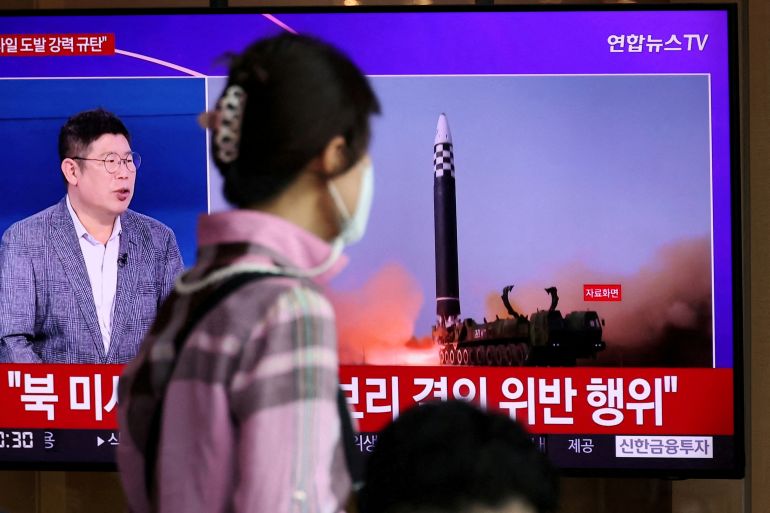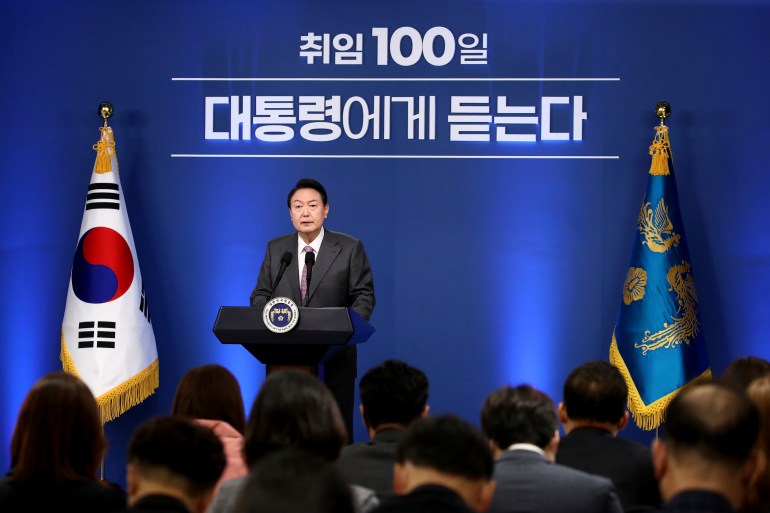N Korea fires cruise missiles, as US and Seoul prepare for drills
South Korea says it is investigating launches after it detected two missiles fired from the North’s west coast into the sea.

North Korea has fired two cruise missiles into the sea, according to South Korean officials, in Pyongyang’s first weapons test since early last month.
“Early this morning, we detected that North Korea fired two cruise missiles into the West Sea from Onchon, South Pyongan province,” an unnamed military official told the Yonhap news agency on Wednesday.
Keep reading
list of 4 itemsPutin says Russia and N Korea will expand bilateral relations
Kim Jong Un claims ‘victory’ over COVID, blames South Korea
Photos: North Korea marks ‘Victory Day’ anniversary
The last weapons test took place on July 10, when the North fired what appeared to be multiple rocket launchers. It last tested cruise missiles in January.
“The US and South Korean military authorities are analysing detailed specifications such as flight distance,” a defence ministry official told the AFP news agency.
The launches come a day after South Korea and the United States began a four-day preliminary joint drill in preparation for the long-suspended live field training known as Ulchi Freedom Shield, which takes place from August 22 to September 1. The exercises infuriate Pyongyang, which sees them as a rehearsal for invasion.

Wednesday also marked 100 days in office for South Korea’s President Yoon Suk-yeol who said his government has no plans to pursue its own nuclear deterrent and called instead for more diplomacy.
Yoon stressed his willingness to provide phased economic aid to North Korea if it ended nuclear weapons development and began denuclearisation, and said that Seoul does not desire political change in North Korea that is brought by force.
“Any dialogue between the leaders of the South and North, or negotiations between working-level officials, should not be a political show, but should contribute to establishing substantive peace on the Korean peninsula and in Northeast Asia,” he said in a press conference.
“We are not telling them to ‘denuclearise entirely first and then we will provide,’” Yoon added. “What we are saying is that we will provide the things we can in correspondence to their steps if they only show a firm determination [towards denuclearisation].”
Heightened weaponry testing
Pyongyang has carried out an unprecedented wave of weapons tests, including a banned intercontinental ballistic missile (ICBM), this year despite tough international sanctions imposed over its weapons programmes.
Those restrictions do not extend to cruise missiles, but there is speculation that Pyongyang is preparing to test a nuclear weapon for the first time since 2017.
The heightened testing activity underscores North Korea’s dual intent to advance its arsenal and force the United States to accept the idea of the North as a nuclear power so it can negotiate economic and security concessions from a position of strength, experts say
At the end of last month, North Korean leader Kim Jong Un said the country was “ready to mobilise” its nuclear deterrent.
Some experts say it is becoming obvious that South Korea has no clear way to counter the leverage North Korea has with its nukes, expressing concerns that Washington might hesitate to defend its ally in the event of war when Kim’s ICBMs would pose a potential threat to mainland American cities.
Some South Koreans have called for the reintroduction of tactical US nuclear weapons that were removed from the South in the 1990s, or for Seoul to pursue its own deterrent.
However, Yoon dismissed the possibility of the latter during the news conference, saying that Seoul will stay committed to an international treaty aimed at preventing the spread of nuclear weapons.
“I believe the NPT [Non-Proliferation Treaty] regime is a very important and necessary premise for permanent world peace,” Yoon said, expressing hope that the US deterrence strategy for its allies could evolve to counter the North’s growing threat.